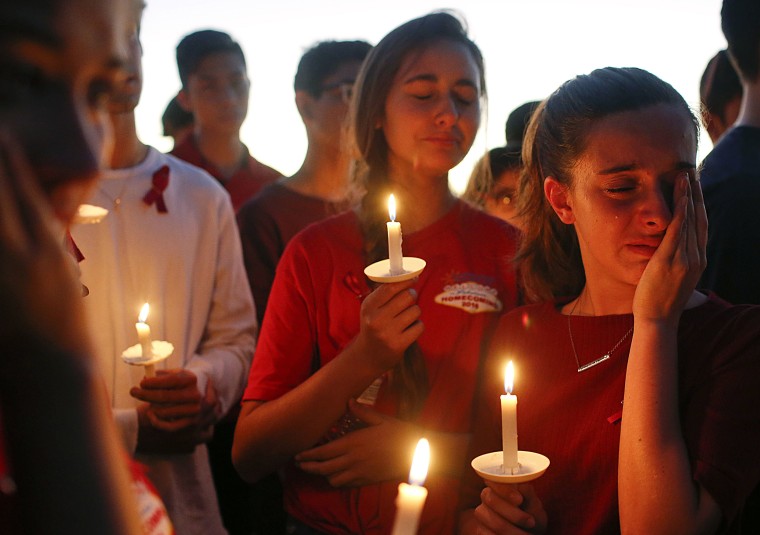PARKLAND, Fla. — From one end of this well-off Florida suburb to another, the question Thursday on everybody's lips was the same: How could something like this happen here?
Until a troubled teenager named Nikolas Cruz, according to police, picked up an AR-15 rifle and killed 17 people at Marjory Stoneman Douglas High School on Wednesday, residents thought mass murder was something that happened somewhere else.
"Don't tell me there's no such thing as gun violence," Fred Guttenberg, whose 14-year-old daughter Jamie was killed, said at a special sunset service for the dead. "It happened in Parkland. ... What is unfathomable is that Jamie took a bullet and is dead."
Fourteen-year-old Ava DiGilio, listening in the crowd, could only agree.
"People used to boast about how this was the safest town in Florida," said the eighth-grader, who heard the shots from within her middle-school classroom. "No place is safe anymore."
Flanking the grieving Guttenberg on the stage at the town's amphitheater were 17 four-foot-tall ornamental angels — one for each victim.
Related: Football coach Aaron Feis died shielding Parkland students
They were lent to the town by the city of Sunrise, Florida, which first used them to honor the victims of the Sandy Hook Elementary School massacre.
"Unfortunately, we have to use them again," said Kevin Pickard, a Sunrise city worker. "We didn't think we'd need them so close to home."
There is no downtown per se in Parkland, which is some 20 miles north of Fort Lauderdale and sits next to the Everglades, that majestic grassy Florida wonder that Marjory Stoneman Douglas — a journalist and environmentalist who died in 1998 — fought to save.
It is a town of subdivisions and gated communities with winding roads and landscaped properties.
It is the antithesis of Manhattan, although many of the estimated 31,000 or so residents are former New Yorkers.
But at gathering places like the Diamond Nails & Spa, the conversations were muted as the tragedy played out over and over again on the shop's TV screen.
"Nobody here knows what to say, how to behave," said one worker as he gave a customer a manicure. "We never had to do this before."
The nail salon sits next door in a shopping mall to a ballroom dancing school which was closed Thursday, and the Dollar Tree store where Cruz had worked.
That, too, was closed — "out of sensitivity to our workers and customers," said the sign in the window.
Sam Shames, 61, who had come by to do some shopping, shrugged at the sign.
"This is not a place you expect to have a mass school shooting," he said.
Kimberly Brechemin, who works at the nearby BJ's Wholesale store and was taking a cigarette break, shook her head no.
"This is exactly the kind of place where mass school shootings happen," she said. "People here don't really know each other and the schools don't have metal detectors."
Plus, she said, "it's so darn easy to buy a gun. What we need to be talking about is how he got that gun."
When told that President Donald Trump was intending to visit Parkland, Brechemin rolled her eyes.
Largely white Parkland gave Hillary Clinton 50.5 percent of the vote in the presidential election and 47 percent to Trump, according to county election statistics.
There were only a handful of people at the service carrying political signs, including Tighe Barry, a Code Pink activist from Miami, whose placard read: "NRA STOP KILLING OUR KIDS."
Chris Grady, 19, Ryan Servaites, 15, and Daniel Duff, 14, nodded approvingly.
All had been at school when the shooting started. All were glad to be alive.
"This is a well-off town," said Servaites. "I know some kids who have tennis courts in their houses and get around their property by golf cart."
But Servaites said those kids were also huddling with him in the auditorium and "scared for their lives."
Grady, who started high school late, said he played basketball with Cruz a couple of times in gym class.
"He was weird and I guess now I'm not surprised it was him," he said. "But I still don't get how this could happen here."
By dusk, the field facing the stage was filled with Parkland residents listening intently and respectfully. Many were sipping water on this balmy evening. On stage, Rabbi Mendy Gutnick tried to comfort the crowd.
"They say God gives us no more than we can handle," he said. "But this is pushing it."
As Gutnick and the other speakers spoke and the sun set, teenagers and grown-ups — many with faces glazed by tears — lit candles against the darkness.
